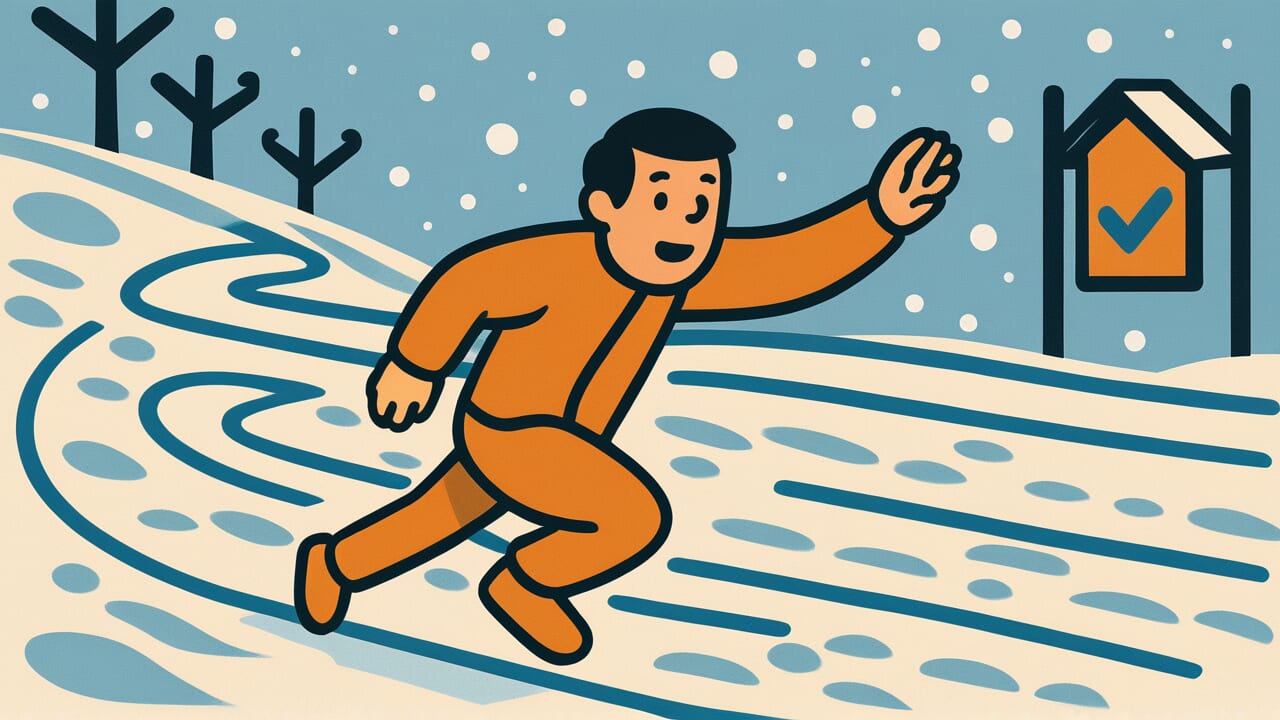How to Read “Running through snow to erase one’s tracks”
Ato wo messen to hosshite setchū wo hashiru
Meaning of “Running through snow to erase one’s tracks”
This proverb means that trying to hide something actually makes it more noticeable. When you take action to conceal something or erase evidence, your behavior draws attention and creates suspicion.
People use this saying when someone makes unnatural excuses or offers too many explanations, making themselves look more suspicious. It also applies when someone rushes to cover up a mistake and ends up creating a bigger problem.
Even today, we see countless examples of this. Someone deletes an inappropriate social media post and it becomes a trending topic. A company tries to hide a scandal and faces public outrage instead.
The attempt to hide something draws attention. What could have been a small issue becomes a major incident. This proverb teaches us that honesty matters more than concealment.
Origin and Etymology
This proverb likely comes from ancient Chinese classics. “Ato” means footprints, and “messen to hosshite” means trying to erase. When you run through fallen snow, your footprints show up clearly against the white surface.
You want to erase the traces of where you’ve been. But your very action of trying creates new traces. This contradiction forms the heart of the proverb.
The snow setting carries deep meaning. Snow is pure white, making even tiny marks stand out. If snow is falling, waiting quietly would let nature cover your tracks. But running around in panic leaves many more footprints behind.
This expression captures something essential about human psychology. When people try to hide something, they often act hastily. That hasty behavior itself attracts attention.
The proverb uses the visual image of footprints in snow brilliantly. Things that would go unnoticed if left alone become suspicious when you try to hide them. The lesson is clear: the act of concealment invites doubt.
Usage Examples
- He’s desperately making excuses to hide his affair, but that’s just running through snow to erase one’s tracks—he looks even more suspicious
- I made excuses to cover my mistake and my boss saw right through me. It was truly running through snow to erase one’s tracks
Universal Wisdom
This proverb speaks to a fundamental contradiction in human psychology. We all have the desire to hide our failures and flaws. But the stronger this desire becomes, the more unnatural our behavior gets, and the more attention we attract.
Why does this contradiction happen? When we try to hide something, fear and panic control our minds. A panicked mind cannot make good decisions.
Tracks that would naturally disappear if we waited quietly become countless traces when we run around in fear.
This proverb has survived through generations because this human tendency never changes. Ancient people and modern people alike repeat the same pattern: the desire to hide something and the counterproductive results it brings.
Looking deeper, this proverb shows the limits of concealment itself. Truth always emerges somehow. Efforts to hide may succeed temporarily, but those efforts become new traces that eventually reveal the truth.
Our ancestors taught us through this beautiful metaphor that honesty is the wisest path.
When AI Hears This
Running through snow leaves footprints. This phenomenon can be explained by the law of entropy increase. Entropy is simply the degree of disorder. In physics, disorder always increases in an isolated system.
A white snow surface has low information content. Everything looks the same. But when you leave footprints, new information appears: “Someone passed through here.” The more you move to erase traces, the more information the system gains. This is the essence of entropy increase.
What’s fascinating is that no method exists to reverse this law. Even completely deleting digital data is actually difficult. When you delete a file from a hard drive, magnetic patterns remain.
If you overwrite to erase those patterns, you create new traces of “having overwritten.” Police digital forensics technology uses exactly this principle.
Crime investigation statistics show that cases involving evidence tampering actually have higher arrest rates. The act of concealment creates new chains of evidence. The laws of the universe don’t allow human tricks.
This proverb understood this truth hundreds of years before thermodynamics was discovered.
Lessons for Today
This proverb teaches modern people the value of transparency and honesty. In today’s society with social media and the internet, information spreads instantly. Attempts to hide things are quickly discovered.
Look at how companies handle scandals. Organizations that admit mistakes early can rebuild trust. Organizations that try to cover up suffer fatal damage.
When you make a mistake, your first instinct might be to hide it. But remember this proverb. Trying to hide makes the problem bigger. Admitting mistakes honestly and dealing with them properly causes less damage in the end.
The same applies to relationships. Piling up excuses to hide small lies destroys trust. You don’t need to be perfect. People who can admit failures and flaws honestly earn more trust in the long run.
Have the courage not to run through the snow, but to stand still quietly. Sometimes doing nothing is the best choice.



Comments